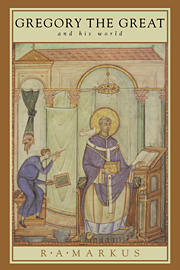Book contents
- Frontmatter
- Contents
- Preface
- List of abbreviations
- Maps
- 1 Introduction: a contemplative in a troubled world
- 2 Integritas animi: ministry in the Church
- 3 Sapienter indoctus: scriptural understanding
- 4 Appropinquante mundi termino: the world in its old age
- 5 The Christian community and its neighbours
- 6 Christiana respublica: within the confines of the Empire
- 7 Terra mea: Italy between two worlds
- 8 Argus luminosissimus: the pope as landlord
- 9 Scissum corpus: the schism of the Three Chapters
- 10 Ravenna and Rome: and beyond
- 11 In cunctis mundipartibus: the far West
- 12 Inconcussam servare provinciam: dissent in Africa
- Epilogue
- Appendix On the distribution of Gregory's correspondence
- Glossary of terms for offices
- Sources
- Secondary works referred to
- Index of Gregorian texts
- General index
Epilogue
Published online by Cambridge University Press: 05 June 2012
- Frontmatter
- Contents
- Preface
- List of abbreviations
- Maps
- 1 Introduction: a contemplative in a troubled world
- 2 Integritas animi: ministry in the Church
- 3 Sapienter indoctus: scriptural understanding
- 4 Appropinquante mundi termino: the world in its old age
- 5 The Christian community and its neighbours
- 6 Christiana respublica: within the confines of the Empire
- 7 Terra mea: Italy between two worlds
- 8 Argus luminosissimus: the pope as landlord
- 9 Scissum corpus: the schism of the Three Chapters
- 10 Ravenna and Rome: and beyond
- 11 In cunctis mundipartibus: the far West
- 12 Inconcussam servare provinciam: dissent in Africa
- Epilogue
- Appendix On the distribution of Gregory's correspondence
- Glossary of terms for offices
- Sources
- Secondary works referred to
- Index of Gregorian texts
- General index
Summary
‘Not Gregory but Gelasius I has rightly been described as the greatest pope between Leo the Great and Nicolas I. But if one were to ask about the greatest Christian personality, then the prize among all popes would have to go to Gregory’ This is how Erich Caspar, the great historian of the papacy, concluded his account of Gregory the Great. Compared with Innocent I or Gelasius I before, Gregory VII or Innocent III after him, Gregory I, Caspar thought, played no part in the development of the papal ‘idea’. His pontificate certainly made little impact on the development of the papacy as an institution. Immediately after his death there was a pronounced reaction against the ascetic ideals Gregory introduced. The groups in the clerical establishment whose dominance he had undermined (see above, chapter 8), in which opposition was concentrated to the new style he had brought to the Roman Church, reasserted their hold on it.
Nor did his pontificate mark a change in the direction of papal concerns and policies. The English felt grateful to Gregory, their father and magister, and shared a veneration for the see of Peter and Paul with the rest of Western Europe. But the papacy was slow to exploit the new openings for Roman influence that Gregory's pastoral and missionary initiatives secured in Gaul and in Britain. Under his successors papal interests remained concentrated in, and to a large extent confined to, Italy and the Empire.
- Type
- Chapter
- Information
- Gregory the Great and his World , pp. 203 - 205Publisher: Cambridge University PressPrint publication year: 1997



